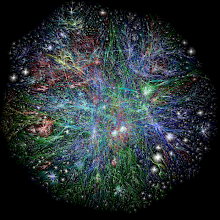Why online communities?
There are a variety of suggested reasons as to why people choose to join online communities. One of the earliest definitions of online communities described them as "social aggregations that emerge from the Net when enough people carry on those public discussions [using the Internet] long enough, with sufficient human feeling, to form webs of personal relationships in cyberspace" (Rheingold 1994, 5 cited in Flew 2004, 62).
Virtual communities have longevity, and can widely be used for functional reasons, such as knowledge and information sharing, promotion, research and business networking. Alternatively, many use online communities as they allow users to share emotional connections, giving them a sense of community (virtually), involvement, influence and acceptance.
Originally, interest in online communities was from social activist communities, setting up a network to inform and express opinions, and share these with others in an online networking environment (Flew 2004, 62-63). As technology has progressed, online communities have been formed by a variety of groups, whether it be to just keep in touch with friends or promote an upcoming product release. One common variable for online communities, however, is that they are created for people with a shared interest, thus creating a community. In regard to Education Queensland's A Learning Place Showcase site, David Potter from The Netride commented,
"The site is not the community. At the end of the day, it is up to the people in the community to build the community. The site should support community-building activities. It is a vehicle for people to travel to centrally located sources of information and to be able to add/edit/delete information whether it be text, images, video clips, panorama images or sound files. Communities are built by people for people with shared desired outcomes. The vehicles and tools aid in the processes of achieving the outcomes." (David Potter - The Netride).
Examples of online communities include:
There are a variety of suggested reasons as to why people choose to join online communities. One of the earliest definitions of online communities described them as "social aggregations that emerge from the Net when enough people carry on those public discussions [using the Internet] long enough, with sufficient human feeling, to form webs of personal relationships in cyberspace" (Rheingold 1994, 5 cited in Flew 2004, 62).
Virtual communities have longevity, and can widely be used for functional reasons, such as knowledge and information sharing, promotion, research and business networking. Alternatively, many use online communities as they allow users to share emotional connections, giving them a sense of community (virtually), involvement, influence and acceptance.
Originally, interest in online communities was from social activist communities, setting up a network to inform and express opinions, and share these with others in an online networking environment (Flew 2004, 62-63). As technology has progressed, online communities have been formed by a variety of groups, whether it be to just keep in touch with friends or promote an upcoming product release. One common variable for online communities, however, is that they are created for people with a shared interest, thus creating a community. In regard to Education Queensland's A Learning Place Showcase site, David Potter from The Netride commented,
"The site is not the community. At the end of the day, it is up to the people in the community to build the community. The site should support community-building activities. It is a vehicle for people to travel to centrally located sources of information and to be able to add/edit/delete information whether it be text, images, video clips, panorama images or sound files. Communities are built by people for people with shared desired outcomes. The vehicles and tools aid in the processes of achieving the outcomes." (David Potter - The Netride).
Examples of online communities include:


2 comments:
Hi Cheese
I agree with your points regarding the sense of 'community' which users of online communities participate in daily.
Thanks for those fantastic links at the bottom of this post.
I agree with your comment that virtual communities can be used for functions reasons, in particular I agree with its use for business networking. However, I don't particularly agree with your comment that they have longevity. In particular, if you look at the decrease in myspace’s popularity when facebook became available.
Meanwhile later in your blog you clarify through David Potter's comment that "the site is not the community...it's up to the people community to build the community". I think this point should be explored more fully by all of us as users. Is it too often that we merely exist in an online community but no interact with it and in doing so our peers?
You also stated that with the progression of technology, these online communities are created for people with a shared interest, thus creating a community. However didn’t these communities already exist? I believe that these online communities are merely a reflection of existing communities. In negative light, it could be seen that these online representations of said communities are, in some cases, replacing the original real community.
Post a Comment